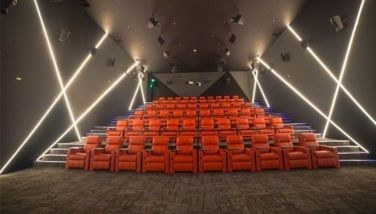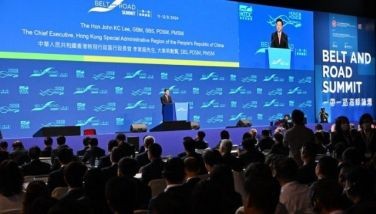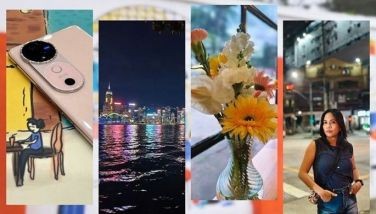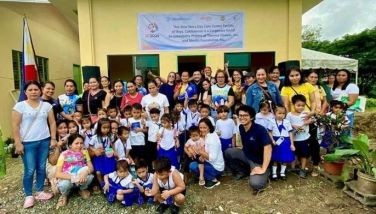Our strong suit
The Philippines may arguably be the worst country in our region in terms of government, politics, the economy, and education, but in at least one area, we rule. I am talking about culture.
We have objective proof. We have won just about everything that can be won in the field of culture. In literature, we have Miguel Syjuco, whose triumph in the Man Asian Literary Prize proves beyond any doubt that, as far as creative writing is concerned, we have left everybody else in Asia in the dust. His book Ilustrado has made waves not only in our part of the world, but in the whole world, having been chosen one of the ten most promising fiction debuts in 2010 by Publishers Weekly.
Our school and professional singing groups win choral competitions so frequently that newspapers rarely even bother to report major triumphs. No country in the world, not only in ASEAN but in Europe, comes close to us when it comes to the number of international choral competitions won.
In theater, we have won all the major theater awards (thanks to Lea Salonga). In film, our young filmmakers lord it over those in other countries in numerous film festivals (including Cannes).
Our most recent triumph in the field of culture came during the Third Meeting of the ASEAN Socio-Cultural Community (ASCC) Council held this month in Hanoi, Vietnam.
Due mainly to the superhuman efforts of the National Commission on Culture and Arts (NCCA) Executive Director Cecile Guidote Alvarez, with the support of NCCA Chair Vilma Labrador and two DepEd Secretaries (Jesli Lapus and Mona Valisno), the Philippines is now considered the lead country in ASEAN when it comes to cultural affairs.
It was not just our incredible artistic resources that won the day (no other country in ASEAN has the repertoire of Western and Asian art forms that we routinely harness), but Alvarez’s brilliant linking of culture to the United Nations Millennium Development Goals. Through her sponsorship and direction of various activities, Alvarez has highlighted the crucial role of culture in poverty alleviation.
According to the official Report of the Council meeting in Hanoi, “the Philippines recognized the importance of integrating culture and effective communication in various forms as a poverty alleviation program, in fighting climate change for human resource and national identity development, as well as human rights education, providing the example of a comprehensive inter-disciplinary best practices module of Kalahi Cultural Caregiving on the UN Millennium Development Goals.”
The Report summarized the outputs of the 4th meeting of the ASEAN Ministers Responsible for Culture and Arts (AMCA) in Clark, Pampanga, last month:
“The Ministers agreed to enhance ASEAN cooperation in the areas of culture and the arts, focusing on human resources development; the protection, preservation and promotion of ASEAN cultural heritage; and the development of small and medium-sized cultural enterprises.
“The Ministers recommended that the Best of ASEAN Performing Arts series be expanded to include other aspects of cultures such as theater, music, art and crafts and organized as an annual event by Member States on a rotational basis to also include the participation of Plus Three Countries.
“The Ministers recognized culture as an essential ingredient for social development in building the spirit of ASEAN, which must be closely linked with ICT, acknowledging the significance of developing ASEAN local content, including collaboration with the Dialogue Partners.
“The Ministers also recognized arts for all as a learning tool for capacity and confident nation-building to protect bio-cultural diversity, nourish the memory of shared patrimony and kinship among ASEAN peoples to triumph over adversity. They stressed the importance of maintaining and preserving ASEAN’s unique and diverse cultures amidst the forces of globalization and homogenization and to fast track ASEAN’s goal to forge one caring, sharing ASEAN Community. The Ministers committed to project, disseminate, and develop the ASEAN unique cultural identity, a strategy for sustainable tourism rooted in pride of habitat, heritage, history, and language by harnessing youth, the resources and expertise of artists, in performance and the wise use of media content with the latest forms of communication technology to encourage new routes of artistic expression from ancestral roots that communicate in cultural symbols people understand.”
The Philippines, in fact, was earlier declared the First ASEAN Culture Capital and Angeles City the First ASEAN City of Culture. This is no mean feat, if we recall that even Filipinos think of Indonesia and Thailand as having achieved more in culture than we have. In fact, when I gave a speech at the NCCA a decade ago proclaiming our superiority to the cultures of our neighbors, I was met with utter disbelief by scholars and teachers!
I know that Alvarez has unfairly been the object of bad press these past months, but no one can doubt what she has achieved in terms of projecting our culture to our ASEAN neighbors. She should not even be bothered by the controversy of her being named a National Artist, because she is already, in the eyes of all the Ministers of Culture in our region and in the eyes of artists in UNESCO, the International Theatre Institute, and other UN bodies involved in culture, an International Artist.
- Latest

























